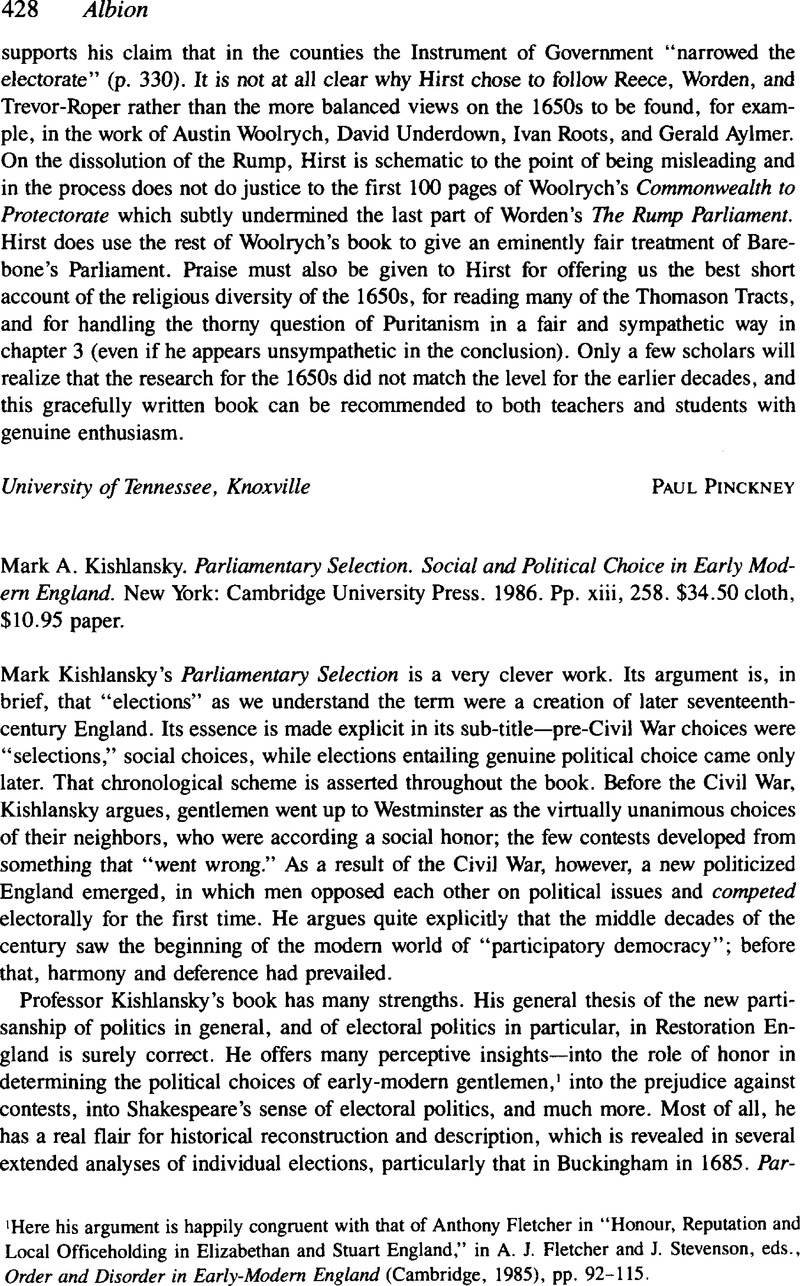No CrossRef data available.
Published online by Cambridge University Press: 11 July 2014

1 Here his argument is happily congruent with that of Fletcher, Anthony in “Honour, Reputation and Local Officeholding in Elizabethan and Stuart England,” in Fletcher, A. J. and Stevenson, J., eds., Order and Disorder in Early-Modern England (Cambridge, 1985), pp. 92–115CrossRefGoogle Scholar.
2 Divisions and voting before 1642 were clearly not quite the aberration which Kishlansky claims. They had long been a feature of the proceedings of the House of Commons—and there too the voice vote was often simply the prelude to a division, to a poll—and Anthony Fletcher has recently shown that voting was standard practice among JPs on the quarter sessions bench (Edwards, J. G., “The Emergence of Majority Rule in the Procedure of the House of Commons,” Transactions of the Royal Historical Society 5th series, 15 [1965]: 165–87CrossRefGoogle Scholar; Fletcher, A., Reform in the Provinces [New Haven, 1986], p. 91Google Scholar). Perhaps unsurprisingly, therefore, Shakespeare in Coriolanus did not see the plebeian determination to make an “election” out of a patrician “selection” in the apocalyptic terms— “sufficient to unbuild the city and to lay all flat”—Kishlansky suggests (p. 5), for the referent of those gloomy predictions (III, i, 197, 203–4) is the tribunes' charge of treason against Coriolanus, not the election.
3 Commons Journals, 1:485Google Scholar.
4 The fact that Sir Simonds D'Ewes thought bribery the “buiing of winde and breath” suggests not only that he believed it a feature of the early-Stuart electoral scene but also that he saw the shout, the election by voice, as rather less unanimous and harmonious than does Kishlansky (Hirst, D., Representative of the People? [Cambridge, 1975], p. 119CrossRefGoogle Scholar.
5 Some of the evidence is set out in ibid., Appendix V.
6 British Library, Harl. Ms. 159, f.77v.; Brit. Lib., Add. Ms. 18597, f.50v. The House's reference to the poll as “the utmost triall” is sufficient refutation of Kishlansky's suggestion (p. 11) that elections by vote were “the very opposite” of elections by voice. In 1641 D'Ewes seems to have thought it natural for poll lists to be compiled in case of a contest; indeed, his speech on the Long Parliament's election bill might profitably be read as a comment on Kishlansky's vision (Brit. Lib., Harl. Ms. 162, f.377). Even at the start of the century, Shakespeare appears to have known about poll lists, for in Coriolanus (III, iii, 8–9), one of the tribunes asks, “Have you a catalogue of all the voices that we have procured, Set down by th' pole?”
7 Keeler, M. F., Cole, M. J. and Bidwell, W. B., eds., Proceedings in Parliament 1628. VI. Appendixes and Indexes (New Haven, 1983), p. 136Google Scholar.
8 This is not, of course, to suggest that patronage was inherently corrupt: few historians today would find anything to object to in Kishlansky's repeated insistence that patronage was an essential fact of political life.
9 I owe the information about Rye to Michael Hunter.
10 Keeler, , et al., Proceedings in Parliament 1628. VI, p. 129Google Scholar; Hirst, , Representative of the People?, p. 149Google Scholar.
11 Henning, B. D., ed., The House of Commons 1660–1690, 3 vols. (London, 1983), 1:63–64Google Scholar. Kishlansky, reviewed these volumes in History Today (Sept. 1984)Google Scholar.
12 The numbers involved were all the greater since by 1642 only five large towns possessed narrowly restricted franchises; at least one of these was soon to be opened (Hirst, , Representative of the People?, p. 92Google Scholar; Kishlansky, , Parliamentary Selection, pp. 174–80Google Scholar).
13 As the 1614 Cambridgeshire case referred to above suggests, by no means all Kishlansky's criticisms are justified.
14 Hobson, M. G. and Salter, H. E., eds., Oxford Council Acts 1626–1665, pp. 91–92Google Scholar.
15 Almost as puzzling is Kishlansky's comment on the 1621 Oxford election, “As Oxford's council continued to nominate the candidates for the freemen to confirm, only [viscount] Wallingford's intervention changed the otherwise peaceful pattern of selection.” Even if we disregard other evidence for municipal tension there, the source Kishlansky used notes that polls were taken—though of course he does not acknowledge them—in 1628 and again in the spring of 1640.
16 Commons Journals, 1:485Google Scholar; Cambridge University Library Ms. D. 11.73, ff. 149–151 (reverse foliation).
l7 2 vols. (London, 1864).
18 Hirst, , Representative of the People?, pp. 61–62, 217Google Scholar and n.
19 That Kishlansky has sometimes mistaken aspiration for reality is suggested by another instance of his failure to make adequate allowance for the formulaic: on p. 23 he notes that, in those early Stuart contests he finds so awkward, “even … when malevolent spirits were hell-bent upon victory, language, actions, and behavior were molded into a decorum based upon mutual respect and deference.”
20 That much of this criticism has passed Kishlansky by is suggested by his unreflective espousal of the localist case: his interpretation of pre-Civil War “selections” rests on the unargued assumption (p. 226) that individuals “gave primary allegiance to their shire.”
21 Which strikingly parallels R. H. Tawney's romantic vision—Tiiwney just put his age of harmony further back in the past. It should be conceded that Kishlansky, in a footnote at p. 16, seeks to deflect such a charge; but a single footnote in no way corrects the burden of the whole case.